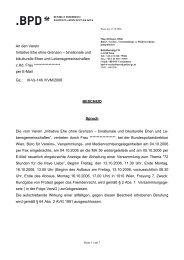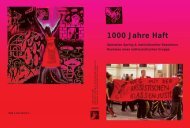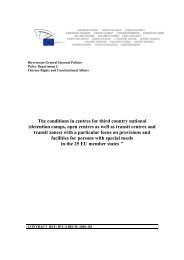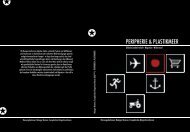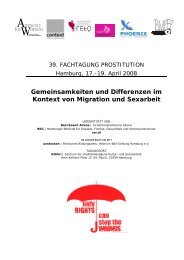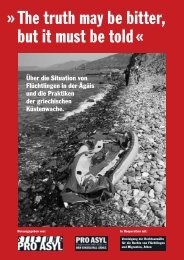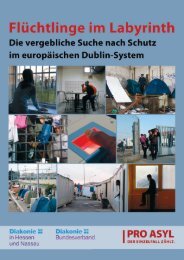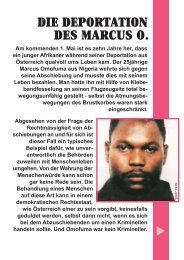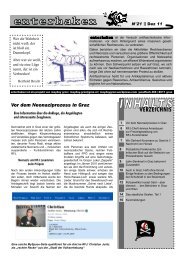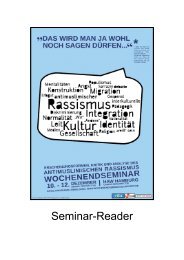Turin's CIE - International University College of Turin
Turin's CIE - International University College of Turin
Turin's CIE - International University College of Turin
Create successful ePaper yourself
Turn your PDF publications into a flip-book with our unique Google optimized e-Paper software.
● ● ●<br />
E.’S STORY (INTERVIEW 22)<br />
Today, E. is only eighteen years old. He was born in Libya, where he lived with his family. E.’s<br />
father was Libyan and his mother is Tunisian: “I escaped from Libya because <strong>of</strong> the war and I<br />
went to Tunisia. From Tunisia I left to Italy”. Conflict and instability have claimed the lives <strong>of</strong><br />
people who were close to E. - his father was recently killed and his brother was shot and<br />
thrown into the sea. E.’s mother was also seriously injured and their house was destroyed.<br />
E. paid 5,000 euros for the twelve-day boat journey to Italy: “I put my life at risk. We were<br />
about two hundred people. It happened that they threw some people overboard who had died<br />
on the ship. I saw that with my eyes”. E. arrived in Sicily in 2010, as a child without<br />
documentation. E. underwent fingerprinting and a wrist x-ray to demonstrate his youth and<br />
he was then taken to a residence for unaccompanied minors: “I stayed there for about nine<br />
months. But over there they didn't feed me and I was beaten up. After a while I got sick and<br />
doctors took me to hospital and I escaped from there”. E. reached Switzerland where he ended<br />
up in a centre for migrants. Shortly after E. was sent back to Italy because his fingerprints<br />
were registered in Italy: “They led me to Milan. I spent seven hours there inside the airport's<br />
immigration <strong>of</strong>fice. They brought me some papers and they made me sign those. But I could not<br />
read in Italian, so I just signed some papers without knowing what was written on them. There<br />
wasn’t anyone able to translate them into Arabic. No interpreters, no lawyers. Nothing. I<br />
realised that the documents were for my expulsion just now, during my detention in <strong>Turin</strong>’s <strong>CIE</strong>.<br />
I have never had problems with justice and I have never been to prison. I want freedom but here<br />
there isn't. I want to go out. Why am I still here?”<br />
E.’s vulnerability and distress was evident from first contact. We had telephoned another<br />
detainee, “F.”, to participate in this study. F. was happy to have contact from the outside<br />
world, and he frantically tried to explain that he was worried about a young man in his cell, E.<br />
E. speaks very little Italian, however fortunately F. was able to translate fluently from Arabic<br />
for us. E. was detained in <strong>Turin</strong>’s <strong>CIE</strong> a mere twelve days after his eighteenth birthday. We<br />
first spoke to E. on his 27 th day <strong>of</strong> detention and we tried to understand if E. had applied for<br />
asylum before being detained in <strong>CIE</strong>, however E. could not answer this question because he<br />
did not understand what we were talking about because he did not even seem to understand<br />
the legal concept <strong>of</strong> a right to asylum. When we asked E. if his attorney had advised him<br />
about his rights, he answered: “I only saw my lawyer at the hearing together with the judge,<br />
that's it. They didn't tell me anything. That lawyer never called me back again and I do not have<br />
his phone number so I cannot contact him”. In light <strong>of</strong> these circumstances, we paused the<br />
research in order to urgently find a lawyer to advise and represent E. with an interpreter.<br />
Due to the language barrier and the priority <strong>of</strong> getting E. legal representation, part <strong>of</strong> E.’s<br />
interview remains incomplete and there are some facts missing. Following the interview, E.’s<br />
new lawyer assisted him to make an application for international humanitarian protection.<br />
E.’s application was rejected by <strong>Turin</strong>’s Comissione Territoriale. According to a later<br />
conversation with F., the grounds that E. received for the rejection were that when E. had<br />
first arrived in Italy, he had said that he was a Libyan. However, in Switzerland E. told the<br />
authorities that he was Tunisian. So, his story appeared to be incoherent and untrustworthy<br />
to the Comissione Territoriale. Yet, it also seems possible that E. could identify as being both<br />
Tunisian and Libyan, since he had a Libyan father and a Tunisian mother.<br />
83 | P a g e




